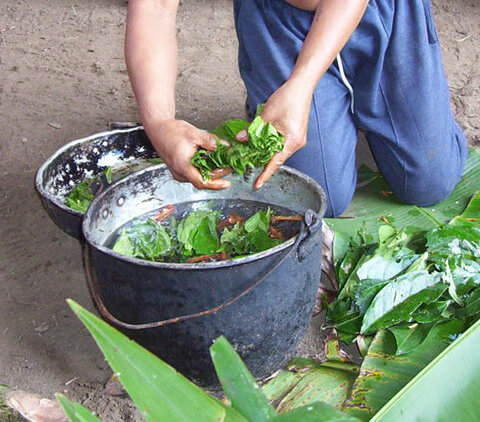Our Postdoctoral Research Associate in Anthropology, Dr David Dupuis, writes:
Have you ever taken the psychedelic brew ayahuasca? Have you ever heard voices during this experience? If so, you might be interested in participating in our Voice-Hearing Experiences Among Ayahuasca Users study.
Ayahuasca and voice hearing-experiences

Ayahuasca being prepared in the Napo region of Ecuador. Image credit: Wikipedia.
Ayahuasca is a psychotropic brew traditionally used in the Amazonian shamanic practices. Since the 1960s there has been growing interest from the West in these shamanic practices. More and more people from Europe and the Americas now seek out spiritual awakenings or personal growth through participation in ritual practices, including the use of the psychotropic brew, which frequently produces “voices” and “visions” among participants.
Coordinated by Dr. David Dupuis in collaboration with Durham University’s Anthropology Department and Hearing the Voice, the Voice-Hearing Experiences Among Ayahuasca Users study is an interdisciplinary exploration of unusual perceptual experiences, such as hearing voices (hearing verbal messages or communications that other people can’t hear), that are reported by users of ayahuasca during or following their experience.
Our study is the first extensive investigation into the relationship between the use of so-called hallucinogenic or psychedelic substances and voices to date. It is also unique in combining qualitative (ethnographic surveys, micro-phenomenological interviews), quantitative (questionnaires, scales) and neuroimaging (MRI) research methods.
The study is part of a broader comparative project conducted with Hearing the Voice, which aims to compare voice-hearing experiences within different groups of people, ranging from mental health services users through to spiritualist mediums. We hope it will shed light on the etiology and phenomenology of voices, the various ways different cultural settings organize one’s relationship with voices, why it is that some voices are experienced as distressing while others are not, how they can change across the life course, and the ways in which voices can act as important social and political forces.
Participation
Anyone 18 years of age or older with previous experience of ayahuasca, regardless of the degree or the context of this experience, is invited to participate.
You can volunteer to participate in the study here.
Procedure
After volunteering, you will be asked to participate in an online questionnaire (in English, anticipated to last around 25 minutes) and, if you are willing, an online recorded interview. A potential third step, involving an MRI study at Durham University, is being considered. Please note that participation in one stage of the study does not mean you are obliged to participate in the next stage.
Complete confidentiality will be maintained for participants.
Contact
If you have any further questions about this study, you please email David Dupuis, coordinator of the study.
